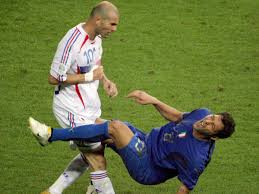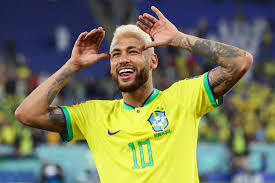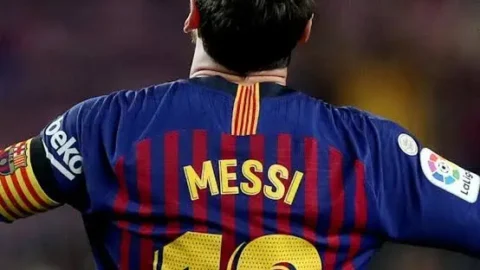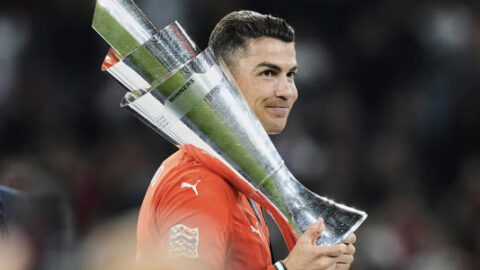The Maestro’s Journey: Zinedine Zidane’s Rise from Marseille Streets to Football Immortality
In the pantheon of football legends, few names command the same reverence as Zinedine Yazid Zidane. His story transcends the beautiful game itself – it’s a tale of poetry in motion, of an artist who painted masterpieces with his feet, and of a man who transformed from a shy immigrant’s son into the embodiment of French football excellence. This is the extraordinary journey of “Zizou,” a player whose elegance on the pitch matched only by the complexity of his character off it.
The Humble Beginnings: La Castellane’s Diamond in the Rough
Born on June 23, 1972, in Marseille’s tough La Castellane district, Zinedine Zidane entered the world as the youngest of five children to Smaïl and Malika Zidane. His parents had emigrated from the Kabylie region of Algeria, seeking better opportunities in France. The family lived in a modest apartment in one of Marseille’s most challenging neighborhoods, where concrete towers housed dreams alongside daily struggles.
La Castellane wasn’t just Zidane’s birthplace – it was his university. The concrete courtyards and narrow streets became his training ground, where young Zinedine learned to navigate tight spaces with a football at his feet. The environment was harsh, but it forged something special in the quiet boy who preferred letting his feet do the talking.
His father Smaïl worked as a warehouseman, while his mother Malika was a housewife who kept the family grounded despite their modest means. The Zidane household valued respect, hard work, and humility – principles that would define Zinedine throughout his career. Despite the financial constraints, his parents never discouraged his football dreams, recognizing that their youngest son possessed something extraordinary.
Early Football: The Spark of Genius
Zidane’s first organized football experience came at US Saint-Henri, a local club where his raw talent immediately stood out. Even as a child, he moved differently than other players – there was a grace, an almost balletic quality to his movement that seemed incongruous with his surroundings.
At 14, he joined SO Septèmes-les-Vallons, where his reputation began to spread throughout the Marseille football community. Coaches and scouts started taking notice of this lanky teenager who could make the ball obey his every command. His vision, his first touch, and his ability to find space in crowded areas were already exceptional.
The young Zidane was incredibly shy, almost to the point of seeming disinterested. He rarely spoke during training sessions, preferring to communicate through his play. This quiet confidence would become his trademark – never boastful, never flashy for the sake of it, but devastatingly effective when it mattered most.
Cannes: The Professional Breakthrough
In 1989, at just 17 years old, Zidane signed his first professional contract with AS Cannes. The club, known for developing young talent, provided the perfect environment for the teenager to hone his craft. His debut came in May 1989 against Nantes, and while it was a brief appearance, it marked the beginning of a legendary career.
His time at Cannes was crucial for his development. Under the guidance of coaches who understood his unique talents, Zidane learned to adapt his street football skills to the professional game. He developed his positional awareness, improved his defensive contributions, and began to understand the tactical nuances that would later make him complete.
The breakthrough moment came during his second season when Zidane started receiving regular playing time. His performances caught the attention of bigger clubs, but more importantly, they gave him the confidence to believe he could compete at the highest level. The shy boy from La Castellane was becoming a footballer with genuine potential.
Bordeaux: The Making of a Star
In 1992, Girondins de Bordeaux secured Zidane’s services, and it was here that he truly blossomed into a star. Under coach Rolland Courbis, Zidane was given the freedom to express himself, playing in a more advanced role that showcased his creative abilities.
His time at Bordeaux was transformative. Zidane developed his trademark moves – the roulette, the elegant turns, the perfectly weighted passes that seemed to defy physics. He wasn’t just playing football; he was conducting an orchestra, with every pass and movement orchestrated to perfection.
The 1995-96 season was particularly memorable, as Zidane helped Bordeaux reach the UEFA Cup final. Although they lost to Bayern Munich, Zidane’s performances throughout the tournament announced his arrival on the European stage. His ability to control the tempo of matches, to find pockets of space, and to create magic from seemingly impossible situations made him one of Europe’s most sought-after players.
It was also during his time at Bordeaux that Zidane began to mature as a person. He married his longtime girlfriend Véronique, and their relationship provided the stability and support that would anchor him throughout his career. Véronique understood the pressures of professional football and became his closest confidante and advisor.
Juventus: European Excellence and Global Recognition
In 1996, Juventus paid a then-substantial fee of €3.2 million to bring Zidane to Turin. The move to Serie A represented a significant step up in quality and pressure. Italian football in the 1990s was considered the most tactical and demanding in the world, and many wondered whether the elegant Frenchman could adapt to its physical and mental challenges.
Zidane not only adapted – he thrived. His five years at Juventus established him as one of the world’s elite players. He won two Serie A titles and reached two Champions League finals, though the European crown remained tantalizingly out of reach. His performances for the Old Lady were masterful displays of technical excellence and tactical intelligence.
What made Zidane special at Juventus wasn’t just his individual brilliance, but his ability to elevate his teammates. Players like Alessandro Del Piero and Edgar Davids have spoken about how Zidane’s presence made everyone around him better. He had an innate understanding of when to accelerate the game and when to slow it down, when to attempt the spectacular and when to keep things simple.
His partnership with other world-class players at Juventus helped him develop the leadership qualities that would define his later career. He learned to handle pressure, to perform in crucial moments, and to carry the expectations of demanding fans and media. The boy from Marseille was becoming a global superstar.
France 1998: A Nation’s Dreams Realized
The 1998 World Cup on home soil was the stage where Zidane truly became immortal. France had never won a World Cup, and the pressure on the host nation was immense. As the tournament progressed, Zidane emerged as the player capable of carrying French hopes and dreams.
The semi-final against Croatia showcased Zidane at his most influential, but it was the final against Brazil that etched his name into football folklore. With two magnificent headers in the first half, Zidane dismantled the mighty Brazilian team led by Ronaldo. His goals weren’t just strikes – they were statements of intent, demonstrations of a player rising to meet destiny.
The image of Zidane celebrating those goals, his bald head gleaming under the Stade de France lights, became iconic. But perhaps more memorable was his composed demeanor throughout the tournament. While others felt the pressure, Zidane seemed to glide through matches with an almost supernatural calmness.
The World Cup victory transformed Zidane from a football star into a national hero. His Algerian heritage made his success particularly meaningful for France’s immigrant communities, showing that talent and dedication could overcome social barriers. The shy boy from La Castellane had united an entire nation through his artistry.
Euro 2000: The Golden Touch Continues
Two years later, Zidane led France to victory in Euro 2000, cementing his status as the world’s best player. His performances throughout the tournament were sublime, but the final against Italy showcased his ability to perform when it mattered most. His golden goal in extra time completed France’s dominance of international football.
What was remarkable about Zidane during this period was his consistency at the highest level. In an era when football was becoming increasingly physical and fast-paced, he maintained an elegance and effectiveness that seemed almost anachronistic. He proved that intelligence and technique could still triumph in the modern game.
The back-to-back international triumphs established Zidane as France’s greatest-ever player and one of football’s all-time legends. His ability to perform in finals, to score crucial goals, and to lead by example made him irreplaceable for both club and country.
Real Madrid: Galáctico Status and Champions League Glory
In 2001, Real Madrid broke the world transfer record to sign Zidane for €77.5 million. The fee was astronomical, but president Florentino Pérez believed that certain players transcended mere football – they were investments in history, art, and global appeal. Zidane was the perfect embodiment of this philosophy.
His presentation at the Santiago Bernabéu was spectacular, with thousands of fans welcoming their new Galáctico. The pressure was immense – he was expected to justify the fee, lead the team to success, and entertain the most demanding fans in world football. For many players, such expectations would be crushing, but Zidane seemed born for this stage.
The 2002 Champions League final at Hampden Park provided the perfect stage for Zidane to justify his price tag. His volley against Bayer Leverkusen is widely considered one of the greatest goals in football history – a moment of pure technique and artistry that defined his entire philosophy as a player. The goal wasn’t just spectacular; it was necessary, coming at a crucial moment when Real Madrid needed magic.
His five years as a Real Madrid player were marked by individual brilliance and collective success. He won La Liga, the Champions League, and numerous individual awards, but more importantly, he embodied everything that Real Madrid represented – elegance, success, and a commitment to playing beautiful football.
The 2006 World Cup: Glory and Infamy
Zidane’s final tournament as a player was a microcosm of his entire career – moments of pure genius shadowed by controversy and complexity. Having announced his retirement after the 2004 European Championship, he was convinced to return for one final World Cup campaign.
His performances throughout the tournament were extraordinary for a 34-year-old player. Against Spain in the round of 16, he produced one of the most complete midfield performances in World Cup history. His panenka penalty in the final against Italy showed his composure and confidence even in the most pressurized situation.
But the 2006 World Cup final will forever be remembered for its dramatic conclusion. Zidane’s headbutt on Marco Materazzi in extra time resulted in his dismissal and effectively ended his career. The image of him walking past the World Cup trophy, his head down in shame and disappointment, became one of football’s most poignant moments.
The incident was shocking because it seemed so out of character for a player known for his composure and professionalism. Later revelations about Materazzi’s provocation provided context, but couldn’t erase the disappointment of seeing a legend’s career end in such circumstances.
Retirement and Reflection: The Man Behind the Magic
Zidane’s retirement in 2006 marked the end of an era. His final match at the Bernabéu was an emotional affair, with fans and teammates paying tribute to a player who had given them so many magical moments. The standing ovation seemed to last forever, a fitting farewell to a football artist.
In retirement, Zidane remained connected to the game he loved. He took on various roles with Real Madrid and the French national team, sharing his knowledge and experience with younger generations. His calm demeanor and tactical understanding made him a natural candidate for coaching, though few expected him to achieve the success he would later enjoy.
His personal life remained relatively private, with Véronique and their four sons providing the stability that had anchored him throughout his playing career. Despite his global fame, Zidane never lost touch with his roots, regularly returning to Marseille and maintaining connections with his childhood neighborhood.
The Coaching Revolution: From Player to Master Tactician
Zidane’s transition from player to coach wasn’t immediate, but when it happened, it was spectacular. After serving as Carlo Ancelotti’s assistant, he took over Real Madrid’s first team in January 2016. Many questioned whether a player known for individual brilliance could successfully manage a team of superstars.
The doubts were quickly dispelled. Zidane’s Real Madrid won three consecutive Champions League titles from 2016 to 2018, a feat unprecedented in the modern era. His ability to manage egos, rotate players, and make crucial tactical decisions showed that his football intelligence extended far beyond his playing ability.
What made Zidane special as a coach was his understanding of pressure and expectation. Having performed on the biggest stages as a player, he knew exactly what his players were experiencing. His calm presence on the sideline, his tactical flexibility, and his ability to make game-changing substitutions marked him as a coaching prodigy.
His success wasn’t just about tactics – it was about man-management. Players like Cristiano Ronaldo, Sergio Ramos, and Luka Modrić have spoken about Zidane’s ability to communicate with them, to understand their individual needs while maintaining team cohesion.
Playing Style: The Poetry of Football
Zidane’s playing style was unique in its combination of power and elegance. Standing 6’1″ with a lean build, he possessed the physical attributes to compete in the modern game while maintaining the technical ability of a much smaller player. His first touch was legendary – able to control any pass, no matter how difficult, and immediately transition into his next action.
His signature move, the roulette (often called the “Marseille turn”), became synonymous with his name. But it wasn’t showboating – every skill, every turn, every pass served a tactical purpose. He used his technical ability not to entertain, but to solve problems on the pitch.
What set Zidane apart was his vision and timing. He could see passes that others couldn’t imagine, and his ability to deliver the ball at precisely the right moment made him the perfect playmaker. He wasn’t the fastest player, but his anticipation and positioning made him almost impossible to mark effectively.
His leadership style was quiet but decisive. He didn’t need to shout or gesture dramatically – his mere presence commanded respect. Teammates knew that if they made the right run or found space, Zidane would find them with a pass. This trust and understanding elevated everyone around him.
Legacy and Cultural Impact
Zidane’s impact extends far beyond football statistics and trophies. In France, he became a symbol of successful integration, showing that immigrants could not only succeed but lead and inspire entire nations. His success opened doors for future generations of French players from diverse backgrounds.
His influence on football tactics was profound. Zidane showed that the traditional number 10 role could evolve and remain relevant in modern football. His ability to drop deep, collect the ball, and then burst forward with purpose influenced a generation of playmakers.
The respect he commands from fellow professionals is extraordinary. Players, coaches, and journalists consistently rank him among the greatest of all time. His combination of individual brilliance and team success, his performances in crucial matches, and his conduct both on and off the pitch created a legacy that transcends statistics.
The Zidane Method: Excellence Through Simplicity
What made Zidane special wasn’t complexity – it was his ability to make the complicated look simple. His philosophy, both as a player and coach, centered on finding the most effective solution rather than the most spectacular one. This approach influenced how modern football thinks about intelligence and efficiency.
His preparation was meticulous but never obsessive. He understood that peak performance required mental freshness as much as physical readiness. This balance between preparation and instinct became a hallmark of his approach to the game.
As a coach, he adapted these principles to team management. His Real Madrid teams were tactically flexible but never overcomplicated. He trusted his players’ abilities while providing clear frameworks for success. This trust-based approach proved incredibly effective at the highest level.
Personal Character: The Humble Superstar
Despite achieving everything possible in football, Zidane remained remarkably humble and grounded. His media interviews were always respectful and thoughtful, never arrogant or dismissive of opponents. This dignity in success and failure made him a role model for aspiring professionals.
His relationship with his family remained central throughout his career. Véronique’s influence on his decision-making was significant, and their four sons grew up understanding both the privileges and responsibilities that came with their father’s fame.
The values instilled by his parents in La Castellane – respect, hard work, and humility – never left him. Even at the peak of his fame, he remembered his origins and the sacrifices made by his family to support his dreams.
The Materazzi Incident: Complexity and Redemption
The 2006 World Cup final incident with Marco Materazzi remains the most controversial moment of Zidane’s career. Rather than defining him negatively, however, it humanized him. The incident showed that even the most composed individuals have breaking points, that perfection is impossible even for legends.
His handling of the aftermath was exemplary. He took responsibility for his actions while explaining the provocation he faced. His dignity in addressing the situation, his refusal to make excuses, and his eventual reconciliation with Materazzi showed character that extended beyond football.
The incident, rather than diminishing his legacy, actually enhanced it in some ways. It showed that Zidane was human, that he felt deeply about respect and family honor. His imperfection made his achievements feel more authentic and relatable.
Global Ambassador: Football’s Gentleman
In retirement and beyond, Zidane has served as an unofficial ambassador for football worldwide. His involvement in charitable causes, his work with youth development, and his role in promoting the sport globally have reinforced his status as one of football’s most respected figures.
His multicultural background – French-born with Algerian heritage – made him particularly effective in bridging cultural divides. His success story resonated across different communities and continents, showing that football truly is a universal language.
The Eternal Legacy: Master of Time and Space
Zinedine Zidane’s career was defined by his mastery of football’s two most precious commodities: time and space. While others rushed, he glided. While others panicked, he calculated. His ability to slow down the game mentally while accelerating it physically made him unique among football’s greats.
His legacy lives on in every elegant turn, every perfectly weighted pass, every moment when a player chooses intelligence over force. Modern footballers still study his movement, his positioning, and his decision-making, trying to understand the secrets of his success.
The boy from La Castellane who learned football on concrete courts became the man who showed the world that the beautiful game could be both art and science. His journey from Marseille’s tough streets to football immortality proves that with talent, dedication, and the right character, even the most ambitious dreams can be realized.
Zinedine Zidane didn’t just play football – he elevated it. He showed that sports can be transcendent, that individual excellence and team success can coexist, and that true legends are remembered as much for how they conducted themselves as for what they achieved.
His story continues to inspire young players worldwide, reminding them that success isn’t just about what you win, but how you win it. In a world where football sometimes feels mechanical and predictable, Zidane’s legacy serves as a reminder that magic is still possible when technique meets intelligence, when preparation meets instinct, and when talent meets character.
The maestro’s symphony is complete, but its echoes will resonate through football for generations to come.



